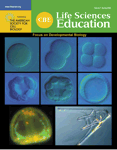Recent Research in Science Teaching and Learning
EDUCATION RESEARCH AND PRACTICE ARTICLES
1. Kirch, S. (2007). Re/Production of science process skills and a scientific ethos in an early childhood classroom. Cult. Stud. Sci. Educ. 2, 785–845. http://www.springerlink.com/content/126t3731207x6517. | |||||
Kirch examines early elementary students' learning of and engagement in science process skills and the establishment of a scientific ethos in the classroom, including questioning, forming, and critiquing hypotheses and identifying evidence, abilities sometimes considered to be beyond the capabilities of young learners. Also of note is the particular journal's format. The lead article is followed by an “interactive dialogue,” titled the “forum,” which makes public a scholarly conversation about the substance of the primary article. Essays authored by individuals with related expertise (in this case, e.g., early childhood science educators and teacher educators) provide critiques to prompt further reflection and spur future research. Kirch responds in a concluding essay to concerns about students' understanding of their engagement in science processes and the significance of the scientific ethos they generate.
2. Talanquer, V., Morgan, D., Maeyer, J., and Young, K. (2007). Linking general education and science teacher preparation. J. Coll. Sci. Teach. 37, 18–22. http://www.nsta.org/store/product_detail.aspx?id=10.2505/4/jcst07_037_02_18. | |||||
Talanquer and colleagues describe an innovative interrelated approach to engaging nonmajors in science learning while providing instruction and assessment experience for future teachers. Specifically, in their own course work, prospective teachers work with their instructors to coplan and coassess the activities in a nonmajors science course taught by the same instructors. The authors describe their own evaluation of the challenges preservice teachers faced as novice instructors and how they used evidence about teaching occurring in the nonmajors course to encourage reflection in the preservice teachers' course.
LIFE SCIENCES EDUCATION ARTICLES
1. Nehm, R. H., and Schonfeld, I. S. (2007). Does increasing biology teacher knowledge of evolution and the nature of science lead to greater preference for the teaching of evolution in school? J. Sci. Teach. Educ. 18, 699–723. http://www.springerlink.com/content/c21898nv3884k320. | |||||
Nehm and Schonfeld investigate whether an increase in secondary science teachers' knowledge about evolution and the nature of science is associated with their preference for teaching evolution in schools. Also included is an informative summary of references regarding common misconceptions about evolution and the nature of science observed in populations of secondary students, college students, and teachers.
2. Riemeier, T., and Gropengießer, H. (2007). On the roots of difficulties in learning about cell division: process-based analysis of students' conceptual development in teaching experiments. Int. J. Sci. Educ. 1–17. (iFirst article, no print volume number available yet.) http://www.informaworld.com/smpp/content∼content=a781884932∼db=all. | |||||
Riemeier and Gropengießer serve as both teachers and researchers in investigations they call “teaching experiments” as they aim to identify the roots of students' difficulties in understanding cell biological concepts, primarily in the context of cell division. The authors first determine students' conceptions before instruction, and then they examine their “pathways of thinking” and conceptual change during instruction.
RESOURCES FOR EDUCATION RESEARCH AND PRACTICE
1. Science in School (http://www.scienceinschool.org) | |||||
This open-access journal features articles about teaching and learning, reviews of current science research, interviews with young scientists and inspiring educators, and discussion forums across the scientific disciplines of biology, chemistry, physics, mathematics, earth science, engineering, and medicine, focusing on interdisciplinary work. Published by EIROforum, a partnership among Europe's seven largest intergovernmental research organizations, the journal is based at the European Molecular Biology Laboratory in Heidelberg, Germany. Most articles are available online in a number of European languages.
2. Web Center for Social Research Methods (http://www.socialresearchmethods.net/) | |||||
This site, developed by William M. K. Trochim, a professor in Cornell University's Department of Policy Analysis, is an access point for resources in social science research methods, including “The Knowledge Base,” an online hypertext textbook on applied social research methods; “Selecting Statistics,” an electronic mechanism for choosing appropriate statistical analyses; and “Methods Tutorials,” projects developed by graduate students in Program Evaluation and Planning at Cornell University for learning about specific social research methods.



